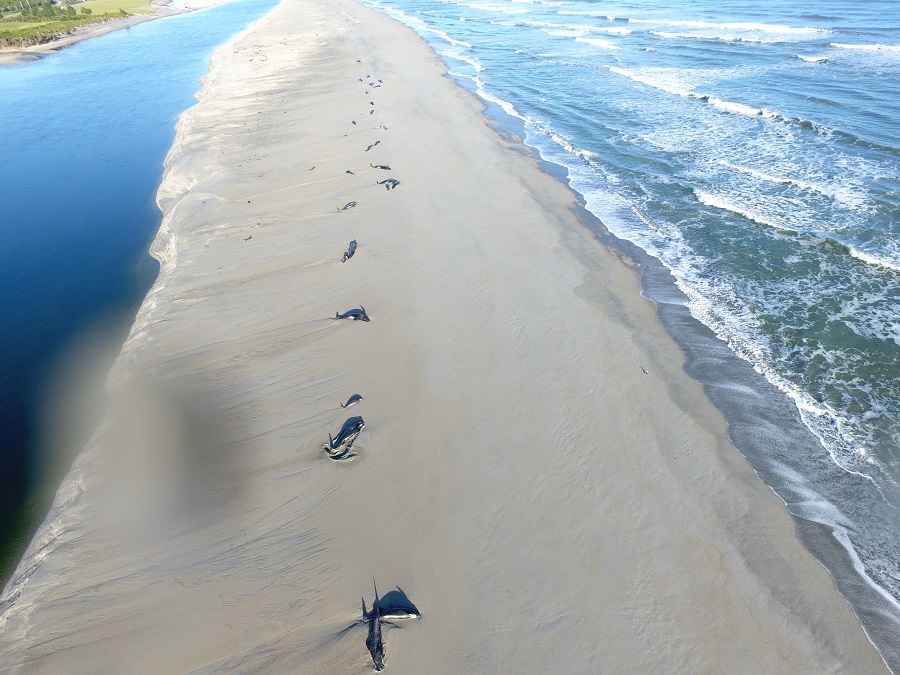
Twelve stranded whales that were still alive from 38 stranded at the mouth of the Okuru River south of Haast were this afternoon euthanised.
By this morning 25 animals had died and 13 others were clinging to life, but with little hope of survival. With rough seas the chances of a successful refloat on the afternoon tide were slim.
The whales are spread along a 3km stretch of beach from in front of the Okuru township, and along the spit at the mouth of the lagoon and river.
Calves were lying next to their mothers, exhausted and dying, and by this morning they had stopped calling to each other.
The Department of Conservation, local residents and iwi rallied yesterday afternoon after tourists first spotted the stranding. Between 15 and 20 people turned up to continually pour water on the whales until it became dark and too dangerous to remain on the sandbar, where most of the animals lay.
DOC says it believes the whales may have been there 12 hours before they were found, but others think they could have lain there since the king tides three days ago.
Some were already dead when found.
Although whales wash up occasionally on West Coast beaches, the size of the Okuru stranding is unprecedented.
The last mass stranding in the region was at Rapahoe in December 1996, when six pilot whales beached.
Okuru resident Helen Rasmussen said others had told that when the stranding was first noticed the whales were calling out to each other.
"That would have been awful to hear. When we first went down, a few were thrashing in the water."
Squally showers in the area yesterday kept the animals cool, but today is fine.
"They're heaving. To me they look stressed, but I don't know anything about whales. It's hard to tell."
Mrs Rasmussen said she believed the most humane thing to do now would be euthanise the surviving whales.
"It's nature. It's in the best interests of the animals. They can't help but be in a stressed state. It's bulls, cows and babies, the whole whanau there. One baby is alive."
The coastline in that area was hazardous, and trying to get them back out to sea could put people at risk as the area was known to experience rogue waves, she said.
Kerry Eggeling, also from Okuru, said the whales were silent this morning, apart from taking a breath and giving the odd puff, while they occasionally moved their tails.
He was notified about 2pm yesterday and was back out this morning. Part of the site is only accessible by boat.
Some had been washed into the river and back out to sea.
Mr Eggeling said the sea was too rough for people to cross the bar and fish, although he said the tide was not particularly high.
With the sea so rough, he was not hopeful they could be refloated on the afternoon tide.
"I would have euthanised them," he said.
"It's sad ... but it's nature."
He said the carcases may have to be moved away from in front of the township before being buried, due to the smell.
DOC said a team of people had cared for the whales but some were not able to be reached.
The decision to euthanise was made in consultation with the local iwi Te Runanga o Makaawhio, Project Jonah and other whale stranding experts.
DOC operations manager Wayne Costello, said the dangerous sea and lagoon conditions meant an attempt to re-float the whales could not safely be made.
“Unfortunately the sea on the West Coast is typically rough and the strong tidal currents in the adjoining lagoon made it impossible for rescuers to safely attempt to re-float the whales, allow them to regroup and to try to get them back to the open sea.”
“DOC staff working with Makaawhio iwi members and local people considered options for a re-float of the whales but in the end this could not be done without considerable risk to both whales and people.”
- Laura Mills











